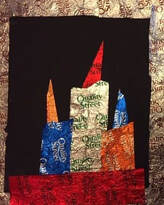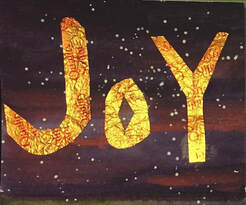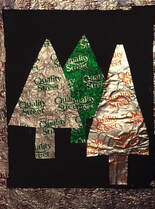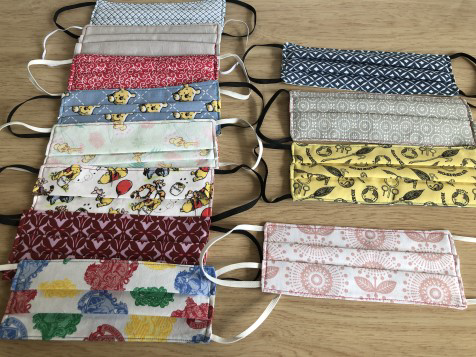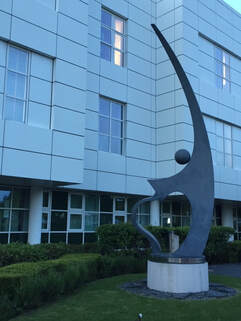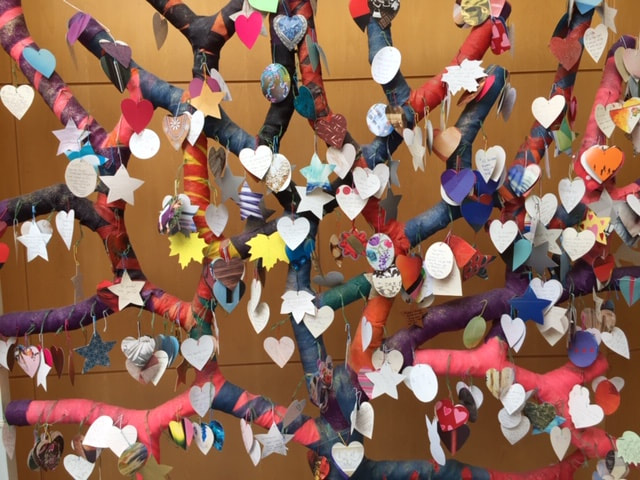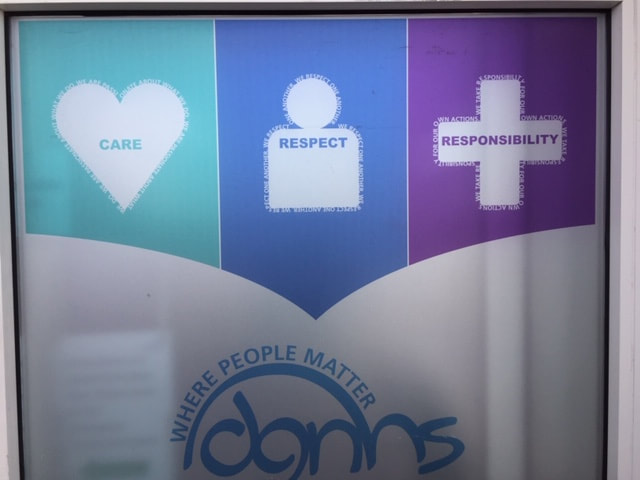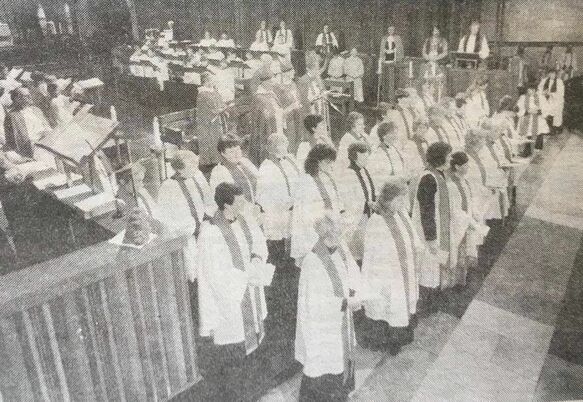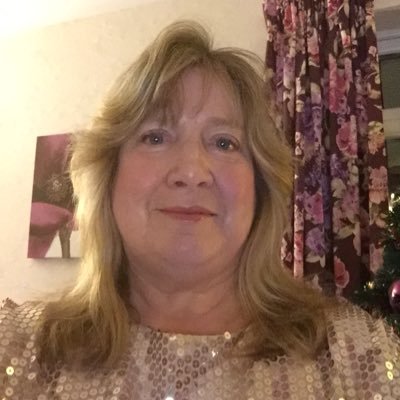|
May this be a morning of innocent beginning,
When the gift within you slips clear Of the sticky web of the personal With its hurt and hauntings, And fixed fortress corners, A morning when you become a pure vessel For what wants to ascend from silence, May your imagination know The grace of perfect danger, And the wheel of repetition, To reach beyond imitation, Deep into the call of all The unfinished and unsolved Until the veil of the unknown yields And something original begins To stir toward your senses And grow stronger in your heart... JOHN O'DONOHUE Excerpt from the blessing, 'For the Artist at the Start of Day' in the books, Benedictus (Europe)
0 Comments
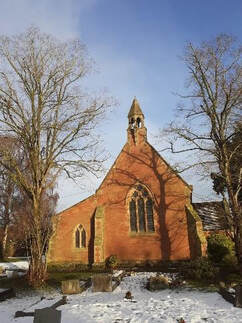 30 years ago, probably almost to the day the Director of Ordinands of Coventry Diocese was holding a POTTY - training session for us new curates. POTTY standing for ‘Post Ordination Training’. He said this: ‘Have you ever considered that the reason you are here now, as newly ordained people, is because it was the only way God could think of to keep you in the Christian Way.’ I have often thought of that during these years in ordained stipendiary ministry. And there is some truth in it. A role that keeps you coming back to the bible on a weekly basis, if only because of the requirement to preach on Sunday, has meant that I have engaged with Holy Scriptures much more than I would have done left to my own devices. 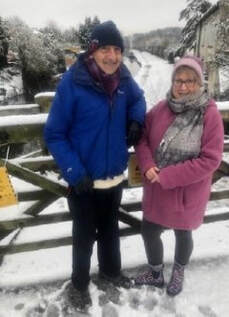 Then there is prayer. The railing against, pleading with, seeking out, of prayer, has kept my relationship with God on the agenda. Too many stories that could be told – but one was when on one Christmas Eve – I heard the news that a young man who lived with muscular dystrophy had died unexpectedly and I knew I had no choice but to go and visit the family – because there was a personal connection, our daughter Liz was going out with that young man’s brother. I remember making my way towards the house – between the Crib Service at 5pm and the Midnight Service that was due to start at 11pm – telling God in no uncertain terms that his timing was lousy and what on earth could I say that would be of any help. So many times, I have found myself without a clue what to do or say. So many times, I have heard afterwards that those moments proved to be turning points for good for the individuals involved. I have thought more than once about the grace of a God who seems to manage to reach into peoples’ lives despite not because of the best efforts of the church and her clergy. As I said, there are too many tales to recount here – but when I have finished my memoir, I will be sure to send you a copy! It has been a privilege to be vicar of Swindon and Himley during the last few years of my stipendiary ministry. I hope that there will be future opportunities to preach and lead worship – but they will be on a different basis. 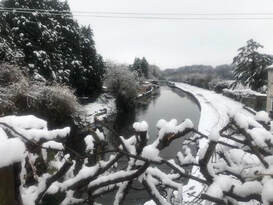 This past, nearly six years, have been a blessing to Ian and me – and our wider family. Being in a half time post has meant that I have been able to attend art school – which I hope has brought added value to my ministry here – it has certainly felt like a gift to me to be able to do that. I have appreciated the willingness of people to participate in Alpha courses, study courses, and try new things in worship. I am aware I am not the most organised person – something I now know is because I am an artist! I attend an Art School full of well intentioned but somewhat disorganised people like me. So, for churchwardens and organists past and present I imagine it has been a trial enduring my last-minute planning. For the current holders of those offices, Olwyn, Keith, Caroline in Swindon, Frank, and Caroline in Himley, – I salute your endurance. And more, I have appreciated your friendship and support and the role of a half time vicar would not have been possible without your commitment. 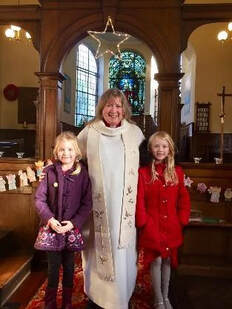 Last Sunday in Himley with granddaughters Hope and Eowyn. Last Sunday in Himley with granddaughters Hope and Eowyn. Ian, Liz and Emily, my family, who also began this journey with me, thank you for being willing supporters. And in more recent years – they have been joined by Matt, Hope and Eowyn – a great asset to the vicarage family. I could not have made this journey without you. 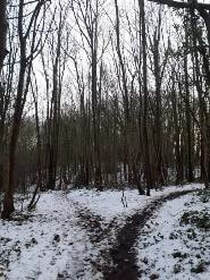 This puts me in mind of the poem by Robert Frost – The Road Not Taken. Two roads diverged in a yellow wood, And sorry I could not travel both And be one traveller, long I stood And looked down one as far as I could To where it bent in the undergrowth; Then took the other, as just as fair, And having perhaps the better claim, Because it was grassy and wanted wear; Though as for that the passing there Had worn them really about the same. And both that morning equally lay In leaves no step had trodden black. Oh, I kept the first for another day Yet knowing how way leads on to way, I doubted if I should ever come back. I shall be telling this with a sigh somewhere ages and ages hence; Two roads diverged in a wood, and I - I took the one less travelled by, And that has made all the difference. Image: Hinksford Woods. Over Christmas some words I saw on social media struck me which were offered in the face of the worsening news about Coronavirus and in the context of the Christmas story –
“we are drawn by hope, not driven by fear.” May that be true of each one of us as we journey forward into our unknown future. You will continue to be in my thoughts and prayers – we will not be moving to our house in Warwickshire until sometime in February – so you may still see us around. I arrived as a stranger to be vicar, but I hope that as we leave, Ian and I are experienced as friends – and that those friendships continue in some shape or form. Thanks, you again for allowing me the privilege of being your parish priest, and your kindness towards me in the final years of my stipendiary ministry. God’s richest blessing to you for 2021. A Reflection for Trinity 7 from Revd Charmaine Host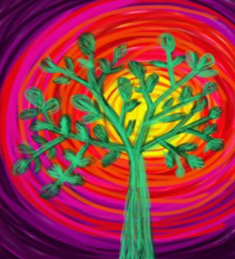 One of the best illustrations I have ever heard about how prayer works was from Richard Forster the author of many books on spirituality including, Celebration of Discipline; I had the good fortune to hear him speak, many years ago, at Spring Harvest. He said this: “Imagine a two-year old approaching her parents with a painting she has just made. How will they react? Will they say, ‘that’s rubbish, what on earth is it’ or will they say, ‘that’s beautiful darling, I can see what you have made, and I love the colours.’? We immediately know the answer to this imaginary conversation, don’t we? A good, loving parent will be delighted at the child’s efforts and even more so that she brought it to them for approval. So it is with prayer. With the reading from today’s letter to the Romans we have arrived at one of the ‘purple passages’ of the New Testament. We can almost sense Paul’s vigour as he writes with passion about the God whose love holds us through all that life and even death throws at us. This love is at work in us through the agency of the Holy Spirit who helps us in prayer; this divine, creative spirit is the one who makes sense of our inadequate paintings in prayer. All those times when we don’t know how to pray or can’t find the words to articulate what is needed are exactly the times when God is closest urging us to turn to him and bring our jumbled brush strokes in prayer. So, maybe prayer is little to do with the words we say but much more about the movement and intention of a heart turned towards God. And those intentions and thoughts are not always pretty. A cursory reading of the psalms reveals the sacred act of ranting! It often amazes me how often we see the psalmist almost spitting words of rage towards the almighty wanting him to smite those who are making his life miserable. Even in our most sacred texts we find a humanity that we can relate to, or at least I can. Vs. 28; ‘We know that all things work together for good for those who love God, who are called according to his purpose.’ This verse alone is a good starting point in prayer. Trusting that nothing is wasted in the economy of God when it is offered to him to work in and through. So, this week, I recommend that this passage is read and re-read, and out of it many ‘prayer paintings’ made and presented to the one who will delight to see them, and somehow use them for his deeper purposes. Thanks be to God. Charmaine Prayer During the Week.Sunday Pray that we may always seek that treasure which is the kingdom of heaven. (Matthew 13: 44) Monday Pray for those in refugee camps with no income because of the virus Tuesday Pray for a good response to the DEC Coronavirus Appeal. Wednesday Pray for local authorities as they take over protection against the virus. Thursday Pray for local surgeries as they consider how to manage the flu jab later this year. Friday Pray for the relationships between the major powers to improve. Saturday Pray for would-be immigrants still crossing the Channel in small boats. Please remember those who have asked for our prayers Sarah Stephenson, Lisa, Julia McCormick, Morgan, Michael Concannon, Heather Gent, Jean, Robert Brooks, Margaret Ward, Joy Waistell, Sarah Aldridge. Those who have died Brenda Ann Mason, Sheila Bates, Edna Bucknall, Margaret Hatton, Berenice Pickering, Mitchell Brooks and David Kingston. Sunday Worship at St Benedict’s 8.00am Holy Communion 10.30am Parish Communion Please remember to book each week by contacting Hilary on 01902 892856 or by email [email protected] There will be a service led by Paul on Facebook and on You Tube this Sunday. Facemasks £5 for men and women (different sizes and styles) and £3 for children. 100% Cotton, washable/reusable, attractive. email Jane [email protected] or phone her on 07939 696486 for products 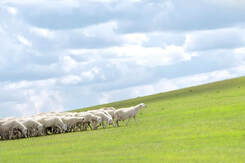 Matthew 9:36: ‘When he saw the crowds, he had compassion for them, because they were harassed and helpless, like sheep without a shepherd. Then he said to his disciples, ‘The harvest is plentiful, but the labourers are few; therefore ask the Lord of the harvest to send out labourers into his harvest.’ Jesus was a great storyteller; he knew that the power of a good story could change lives. But in today’s gospel reading he is not telling a story; he is describing the reality he sees before him. Jesus looks with compassion at the crowds, harassed and helpless, and he asks his disciples to imagine a new story and themselves as story tellers. When we live in a story that seems to determine the future there is a danger that we will feel trapped thinking that things can never change. That can be true of our own personal life stories. 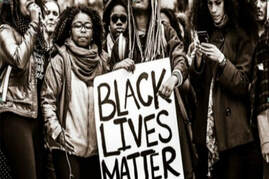 Crowds that are harassed and helpless are becoming a feature of our time. Whether protesting Covid 19 lockdown or the more recent ‘Black Lives Matter’, we see crowds of people who are angry and harassed because they feel helpless and when we feel helpless, we feel vulnerable and unable to control anything within our world. This in turn engenders resentment and rage. Perhaps this is what lies behind the Black Lives matter movement; when the story of a people is one of discrimination and oppression it is time that this story was heard and changed. It is a tale as old as the Bible itself, the book of Exodus tells a story of a people in slavery who are finally delivered into freedom through divine activity. The story Jesus wants his disciples to recall, is that we are called to be kingdom partners with God and with his authority to be a healing presence amid confusion. Not pretending we have all the answers but neither failing in our call to pray and share peace. St. Paul writes about this in an ancient letter to a group of Christians in Rome, he speaks of the peace we have with God because of the work of Jesus and with this we are reminded that our story has been rewritten. Our stories have been caught up in the story of God in his world. Vs. 5: ‘His love has been poured into our hearts through the Holy Spirit that has been given to us.’ We can be part of the stories of others with that same good news. 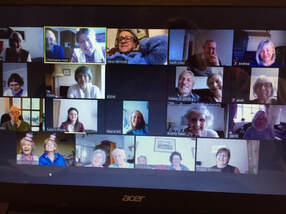 Zoom latest. Around 20 of us are still meeting on Sunday morning at 10am for a service via Zoom. It is an encouraging point of contact for us all in these lockdown times. If you would like to try it out then please join us and me know so that I can send an invitation. You would be most welcome. Rev Charmaine 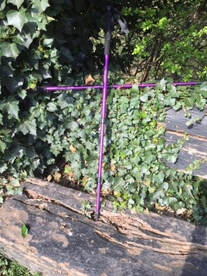 There has been one huge advantage to lockdown for me, assuming I don’t catch the virus I will end up fitter coming out of it than when I went into it! The ‘stay at home’ and ‘only go out for exercise’ mandate was all the incentive I needed to make sure that I went for a walk every day. So, I discovered the hitherto untravelled delights of walking in the woods in Swindon – because for a while, even Himley Park was locked. I’ve walked through the woods, seen the bluebells come and go, watched the trees come in to leaf and have become quite familiar with the population along Swindon canal as I walked by with my newly purchased walking poles. They doubled up on Good Friday morning to make a cross for my solitary procession. Since then as we have had such glorious weather, life on the canal has seemed idyllic. Boat owners sitting alongside their vessels sipping a chosen beverage in the early evening sunshine has put me in mind of exotic foreign holidays. One resident even called out across the canal (very useful for social distancing) ‘It’s Majorca over here!’ So, yes, I am fitter if not leaner. 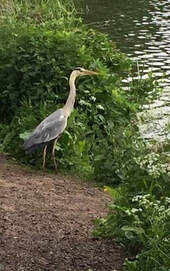 Walking rather than driving in a place is different, you see things that are usually missed. For example, on the side of the canal, the stately heron keeping perfectly still waiting for the right moment to swoop in and catch a fish. Walking slows you down giving time to unwind the tangle of thoughts swirling around the mind which can be turned to prayer. Walking in God’s good creation is grounding and connecting and in lockdown when deprived of the usual distractions there is nowhere to run, nowhere to hide from oneself or God. 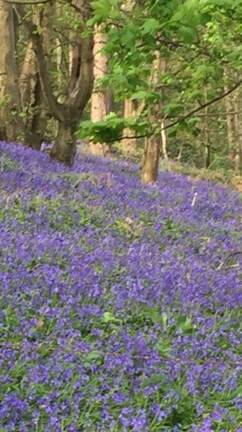 Our daily walk meant that on the evening of VE Day 75 Ian and I were exchanging pleasantries with socially distanced neighbours sitting in their front gardens. One spoke up and said: ‘It was so good to hear the church bells ring’. Another stopped his cycle ride to express how glad he was to hear the church bells ring again. Only two days earlier we had been given permission for one person to enter church so we decided that at least one VE Day decision could still go ahead as originally planned. The church bell would be rung at 7pm on Friday 8th May 2020, and it was by our faithful churchwarden Keith Lilley. I did not anticipate how much it would mean to people. It seems that in these days of Zoom, Skype and a host of online shopping opportunities, it is still important to have the reminder of something unchanging and eternal; explaining why Swindon residents were so encouraged by hearing one solitary church bell rung once more. As well as being fitter I am marginally more tech savvy. I have had the chance to join in Morning and Evening Prayer with Top Church Dudley who, because of their gifted team, were able to get going very quickly with Zoom. This gave me the courage to try it out for myself so for a few Sundays I have led a service from my study to which members from Himley and Swindon have been invited. We have enjoyed seeing each other and it has helped us all in our isolation. Things were going so well that I extended the invitation only to find that on the first Sunday with the expanded congregation I had twenty people in the waiting room who I was not able to let in! Panic ensued, pride came before a fall, only discovering later that Zoom had crashed worldwide! Since then we’ve dusted ourselves off and started all over again! So far, so good. If you would like to join in our Sunday service, please send me a message with your email and I can send you the link. Or if you think you’d like to try it but lack the ‘Zoom know how’, don’t worry we can help you with that too. In a world that has changed so much it is good to remember the words of this hymn, inspired by Psalm 46: God is our strength and refuge, our present help in trouble; and we therefore will not fear, though the earth should change! Though mountains shake and tremble, though swirling floods are raging, God the Lord of hosts is with us evermore. And, to echo the words of the Queen’s VE Day message ‘Never give up, never despair.’ God Bless, Rev Charmaine 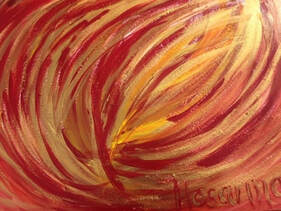 This is the strangest start to Holy Week that I have ever experienced in nearly 30 years of ordained ministry. Normally at this time I have a full week of activities ahead to help my congregations journey through Holy Week towards Good Friday and Easter Sunday. But these are not normal times. We are in the midst of a pandemic. Covid 19 has interrupted all of our plans so even our churches are locked, inaccessible even to their clergy and we are all under instruction to ‘Stay home and Save lives.’ I’m sure I’m not the only Parish Priest wondering what to do with their time and asking how we can be useful to our parishioners if we can’t even run the Sunday Services for them. Whether we like it or not we are forced to change the way we live. Shopping trips are out except for the purchase of food and even here anxiety has crept in so that panic buying has stripped the shelves of essentials. Only the other day I visited my local Sainsbury’s late in the day, we had run out of milk and bread, and I was delighted to find a multi-pack of baked beans and a packet of pasta. Who would have thought that these would become much coveted items. The joy of discovering them made me realise how I always take for granted that I can obtain all I want and need whenever I want them from the local supermarkets. Rarely stopping to give thanks and more often than I care to admit, I easily feel resentful if a favourite item is missing. Perhaps, joy and thanksgiving could become the new normal response to the abundance so many of us enjoy, the rule rather than the exception. Though, maybe the image of being stripped bare is a good one for this season. As we continue to make this journey towards Easter and our national journey towards healing and we are stripped of our usual activities it can be a time for more reflection and thought about what matters to us. GOOD FRIDAY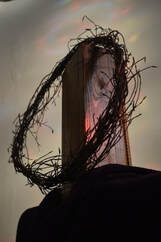 This was day when everything was stripped away. Jesus, in his life, had already laid aside his heavenly majesty, now he was being stripped of his very life. The cross was the place of human shame and degradation, the lowest point of human pain and suffering. And our God meets us there. There is no hiding at the cross, we cannot avert our eyes or hide from view. There is no cover up. Right now, we are living through unprecedented times because of Covid 19, we too are facing a life that is stripped bare. The usual tasks that occupy us, the daily routines of going to work, and the social niceties of visiting friends and family have deserted us Can there be hope for us still from the cross? St. Paul, writing to the Christians in Galatia wrote this: “For Freedom Christ has set us free. Stand firm, therefore and do not submit again to a yoke of slavery.” Galatians 5:1. Jesus’ death on the cross was for our freedom. There is power in the cross that can bring freedom, freedom from attitudes and worn out ways that no longer serve us. And perhaps never did. There is a prayer I like to use in the morning that has these words: Open our eyes to acknowledge your presence, that freed from the misery of sin and shame we may grow into your likeness from glory to glory. The power of the cross is the divine gift of release from all that binds us. This season of social distancing might also be an opportunity to embrace and grow into that freedom. And the resurrection calls us out to live that freedom. When panic buying was at its worst, national fear and anxiety was increasing and while we were still able to walk around Himley Park, I was taken by the beauty of the blooming Magnolia. I wrote this poem, it served as a reminder to me to notice and consider what was important. 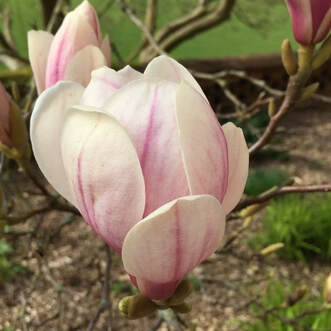 Yet still the Magnolia beckons, A herald of Spring calling us forward to faith not fear. Creation’s generosity Reminding us to consieer the lilies of the field while nature’s bounty echoes Those immortal words: ‘You shall not live by bread alone.’ And Easter reminds us: ‘The Lord is risen, He is risen indeed.’ Alleulia. I shall be celebrating Holy Communion on behalf of Himley and Swindon at 10am on Easter Day in my makeshift sanctuary – the garden summer house! I also update the churches Facebook pages with images so that is a good way to stay in touch. God Bless you and keep you safe, Charmaine. 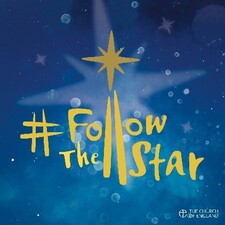 I love lighting fires. It feels a bit non-pc to say that these days not least in these times of climate change when the burning of fossil fuels contributes to global warming, rising sea levels and soaring temperatures are the result. Nevertheless, I love lighting a fire on a cold January afternoon in the vicarage hearth. I have become something of an expert at lighting fires as throughout my ministry we have been blessed with living in houses that still have open fires. Though expertise at fire lighting has not always been the case. In my first post when I was living in the country and we had just moved into a 16th century vicarage with an open fire my attempt to light a fire failed miserably. It was 1996 and we were moving house during the coldest January for years. The vicarage had been empty for some months and a day of removal men coming and going ensured the house was freezing cold. The large rooms with high ceilings and sash windows were filled with cold air which yielded little to inadequate radiators and oil-fired central heating. But we had a fire, or at least a fireplace and some logs, though we couldn’t understand for the life of us why they just did not catch alight when we put a match to them. After several feeble and unsuccessful attempts to light a fire we gave up until the next day when I asked one of my churchwardens if he could help. He was a farmer, a son of the soil, and farmers are known to be able to turn their hand to anything. David was gracious and gently inducted us into the art of laying a fire. We were taught and shown that it requires careful layers of newspaper, kindling wood, small sized coal to get it going before it can take on the challenge of logs. Purists would say that method should work every time, the rest of us have discovered that firelighters are an invaluable addition in ensuring a successful blaze. Those long white cuboids impregnated with lighting fuel work like magic. Though they too are probably not so good for the planet. 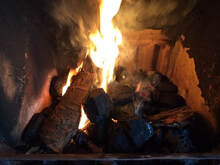 David, my churchwarden, told his wife later; “That new vicar and her husband are real townies, they haven’t a clue how to light a fire, they’re trying to do it by putting a match to two logs!” I think of him most times that I light a fire and since those days I too have honed the art of successful fire-lighting. For a start there is no easy way to learn except by continuing trial and error. Sometimes you think it’s all going blazingly only to find it doesn’t ‘catch’ and you end up having to clear everything out and start again. I find building a fire and watching it slowly come to life is one of life’s pleasures. It is also a centring and meditative process. I am absorbed when I watch the small flame curl it’s way round the coronets of newspaper, crackling through just the right amount of kindling wood and creating the perfect environment for the coal to begin to burn. And yet it is also mysterious. The path a flame takes is unpredictable. Sometimes one side of the fire will catch alight while the other half remains untouched. The story is still legible on one coronet of barely scorched newspaper while its companion sheet is consumed by flame. You may be able to see this on the photo I took to try and capture this. The art then is working with the small section of the fire that has caught alight trusting that as it grows the warmth will spread and take in the rest. You must fuel the fire, feed it with just the right amount of coal, and it will work its magic. 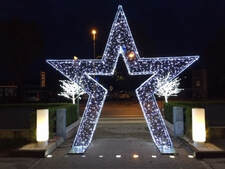 This speaks to me of life and human flourishing. We need to fuel the fire of our hearts and minds. Do we take too long trying to keep everything going when nothing seems to be catching alight? Perhaps dull, unresponsive attitudes and activities need to be let go when all they do is drain us. Over the years I have tried to be aware when a spark of inspiration or curiosity catches my attention causing me to want to know more or follow that star. I fear that all too often I have ignored those inner impulses because of laziness or given in to the tyranny of the urgent rather than take note of the important. Images of fire in the biblical tradition are often a sign of God’s leading. In the Old Testament, Exodus chapter 3, there is the story of Moses and the burning bush; even his attention had to be caught by fire as he watched a bush burning whilst wondering why it wasn’t being consumed by the flames. I understand that a little more now as I watch my fire both alight and yet not consuming all the fuel. I wonder how many bushes had to be set alight before God got Moses’ attention! Later in the New Testament at the feast of Pentecost, tongues of fire appearing over the disciples’ heads symbolising the presence of the Holy Spirit coming to empower them to do God’s will. Fire burning but not consuming. As I write, we are in the season of Epiphany, this is when we remember the journey of the Magi. These wise men were curious, attracted by another flame, this time in the form of a star. Perhaps this ball of heavenly fire ignited in their hearts an answering flame which they could not resist until it led them to Jesus. The one we affirm in Holy Communion as: Our Saviour, born of Mary, in whom all our hungers are satisfied. This New Year may we be given 2020 vision so that we don’t miss the signs of God’s presence with us and may your hearts and mine be warmed by the fire of His love. Charmaine 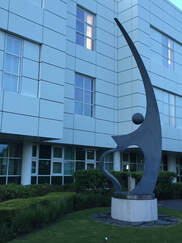 I am learning that the journey towards healing and wholeness is anything but linear. It is not like getting on a train at Euston through to Wolverhampton where you arrive on time, refreshed and uninterrupted by such things as leaves on the line or the wrong type of snow. No, it is a chequered ride with unexpected delays and even the occasional derailment necessitating a substitute bus service. I first reflected on this Vocation to heal almost three months ago. At the time of writing then I was just about to return to hospital for a gall bladder removal or to give it the proper term a cholecystectomy. That procedure did go well requiring only a half day in hospital and a straightforward recovery period. I experienced great kindness and courtesy in hospital not least from the two recovery nurses who took care of me after the surgery. I fell into conversation with one of them as she attended to my still immobile body. I asked her if she enjoyed her job. Her immediate reply was refreshing and heart-warming as she responded to my question with, ‘I love nursing.’ This was a vocational statement, it came unfiltered from her core and it showed in her courtesy, kindness and attention. The American Pastor Frederick Buechner describes vocation as ‘the place where your deepest longings and the world’s great needs meet.’ There was, however, a small cloud on my horizon. Though the surgery had been successful a further tidying up procedure would be necessary to finish off what they couldn’t quite achieve in surgery. I’ll spare you the details not least because I don’t quite know how to put it into words myself! Nevertheless, as I said, the recovery went well even to the point where I was able to swim 22 lengths again the day before this second procedure was due. 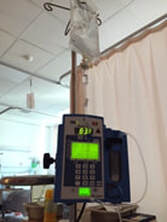 On the morning of my return visit to Russells Hall hospital I felt well even though a little apprehensive about what lay in store for me. My consultant talked me through what would happen, he outlined the risks involved as they are required to do explaining that though there was a risk of something else being set off by this procedure, it was very small. I should have known that even as he looked me in the eye, I would be one of the one or two in a hundred to whom this happens. The result being that later that evening I was being transported to back to hospital by ambulance with acute pancreatitis. An eight day stay in hospital followed which was eye opening. The first four of these days had me ‘nil by mouth’ negotiating my way around the ward attached to a saline drip. The last time I had a hospital stay was in 1982 around the birth of our second daughter. Life on the ward was challenging, not least because it is strange sharing intimate space with three other patients who are strangers and their attendant visitors. A daily visiting period of eight hours was also challenging and mitigated against any possibility of rest during the day. As was the television being on all day whether people were watching it or not, though as my stay went on, I did get some control over that! I reflected on the need people seemed to have for a constant stream of noise in the background, quiet times quickly became filled with chatter, and I wondered why we find it so difficult to simply sit with quiet either on our own or in the company of others. Even in church life when we gather for worship, we find it hard to hold quiet or silence. Sometimes when I am presiding at the Eucharist it surprises me to realise that after people have received the bread and wine of Holy Communion they return to their seats and simply chatter rather than enter into quiet contemplation and open themselves to the still small voice of God. 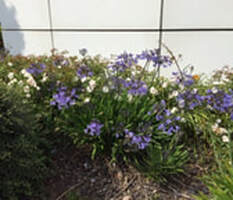 There were times in hospital when I felt I was on an emotional and psychological roller coaster sometimes at rock bottom when all I could do was weep and silently cry out to God. On a few occasions this led to some important encounters with medical staff. I can recall times when I simply started crying while a nurse was carrying out routine observations; each time they paused, positioned themselves lower than me and listened with empathy, validating my feelings. These five-minute encounters felt lifesaving. When I said to one nurse ‘I don’t think I can take any more I think I need to discharge myself’ she replied by saying, ‘well you could, but you’ve come so far and I’d hate for you to have to come back and start all over again.’ This caring response made me realise I needed to stay in hospital but that it might also do me good to get outdoors and off the ward when the weather permitted to enjoy the barest of hospital gardens. When I left hospital, I was aware that I was leaving in better shape clinically than when I arrived but with much to process and grateful for the quiet of home. On my discharge letter the doctor described me as a ’65-year-old sweet lady’ – probably the only time I’ve been described as sweet in my life! And I know my attitude in hospital wasn’t always ‘sweet’. Most of the time I experienced caring and diligent nursing staff who have to turn up daily to minister to ‘us’ the general public. I was thankful too that thanks to our NHS I didn’t lie in hospital counting how many saline drips, morphine shots and consultant visits I worked my way through knowing that they would appear on an itemised bill at some point after discharge. Neither would I be charged for having called an ambulance as I would have been if I was a resident in the USA. I was acutely aware that I wouldn’t be leaving hospital to face a bill that might bankrupt me, which is the fate of many who live in countries without a health care safety net. The food was fair enough and free and small kindnesses meant a lot. On my first morning a nurse asked if I wanted a wash, I did I told her but didn’t have anything with me yet, not even a toothbrush. ‘Don’t worry’ she replied, ‘I can get you all of those.’ So, along with towels, sachets of shampoo, body wash, toothpaste and toothbrush appeared, plus shaving cream. The shaving cream was a mistake she hastened to assure me. 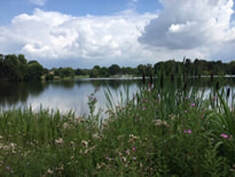 At the point of writing I am still off work journeying through the healing process which is, as I said at the beginning, anything but linear. But trying to remind myself daily to be thankful and prayerful for those who carry out with honour their vocation to heal. Reminding myself also that healing comes in a variety of ways, among them walking in God’s good creation, not least in our own local Himley Park. Charmaine Host It began with a call to 111, the NHS helpline. After a night of unremitting stomach pains, I decided I couldn’t wait until the GP surgery opened at 8am so at 5.30am I was relating my symptoms in a phone call. The polite male voice asked me a series of questions which concluded with advice to seek medical help within two hours from the Urgent Care Centre at Russells Hall Hospital. I expected this though I didn’t welcome a visit to A&E knowing how long these visits can take only to be directed back to the GP. This time it was different. By the time I arrived at A&E with my trusty husband/carer/chauffeur I was in a great deal of pain. Thankfully It was almost empty, and I was ushered through to a cubicle. Relief eventually came in the form of strong pain relief administered intravenously, blood taken for testing and blood pressure monitored. Oh, and oxygen administered because my saturation was a bit low and temperature taken. It was busy, the staff on duty were constantly occupied and I faced yet again the reality of how dependent our NHS is on staff from overseas coming to work here. There was also courtesy. It was humbling to be treated with such courtesy. It was humbling to see that I was in the hands of people who wanted me to get well. Time in an A&E department seems to function differently to ‘outside time.’ From my morphine induced haze I heard someone casually reply to a request for the time, ‘it’s 10.20am.’ Ten-twenty? I was sure it was at least 3pm. I had expected that my visit to hospital would end with receiving good pain relief and advice to visit my GP later that day, the medical staff had other ideas. I was referred to the surgical unit thanks to finding a scan that was taken two years ago, on my medical records. To my surprise a porter came with a wheelchair to take me to the surgical unit, I had expected to walk, perhaps I was worse than I thought? More doctors, nurses and health care assistants, many of them with origins far from these shores. More blood taken, ECGs, examinations, blood pressure checks and a consultant who was curious to know why I hadn’t followed through with a procedure when I had the scan two years earlier. My GPs words came back to me ‘It’s good to resist the surgeon’s knife for as long as possible’. This advice given at the time because everything had calmed, and I was symptom free. I replied simply ‘My GP was cautious.’ Yes, it was busy, yes sometimes it seemed chaotic and no there were no beds. One doctor wanted to keep me overnight and I was escorted to the ‘Fit to Sit’ ward. This is a ward where you have a reclining armchair and they can administer all the medical care you need, it’s a kind of halfway house where you wait for a proper bed. I was promised that there would be a bed eventually, but by 9.30pm I realised I didn’t want to spend the night in an armchair when I had a perfectly good bed just a few minutes’ drive away. So, with permission to leave and promising to return the next morning I left with my pain medication. What have I learned?
The vocation to heal is a high calling, and I saw close at hand how all these people were working to make me better. They are not rewarded nearly well enough for their skill and dedication. The under-resourcing and bed shortage in the NHS is a disgrace and the people who it distresses the most are the staff. I overheard one nurse saying this; ‘it is such a stressful shift with no spare beds anywhere in the hospital’. How fortunate I was to have a partner who was able to take me to hospital and stay with me, then take me home, something I take for granted far too easily. How blessed we are to have the services of such a medical facility that we can access without having to think for a moment of how we are going to be able to pay for it. How human it all is. It’s always fun when I answer the question, ‘So what do you do for work?’ with ‘I’m a vicar.’ There is always the moment when the unspoken thought ‘I wasn’t expecting that’ emerges into consciousness. Then there was the woman who brought round dinner, dispensing a good enough selection of meals (I enjoyed the fish pie) then asking if I wanted Bakewell tart. I had already been warned off by the doctor to avoid anything fried, so I said, ‘I think I probably ought to have some fruit.’ She gave me a banana, two apples and a satsuma. When I protested, she said, ‘you might get hungry in the night.’ I was moved by the healing properties of those kind and thoughtful words. And thank goodness they have not yet received the memo with the NHS directive about calling patients by their proper names – who wants to be called Mrs Hoist rather than ‘Bab’? Yes, the name is Host and they almost always get that wrong. Here’s a prayer that I will try and pray more often from now on: Healer of nations, you provide insight to all who seek you, and defend those in need. Thank you for the gift of health services in our nation, freely available to everyone no matter their background, income level or need. Give your wisdom to our government, health professionals, and advisers as they seek the right reforms. Bless our health service to thrive, to prosper, and to heal. Bless our doctors and nurses to care, to excel and to bring healing. Bless our nation to understand, thank, and honour those who seek to bring us health. For everything that is good comes from you. Amen. 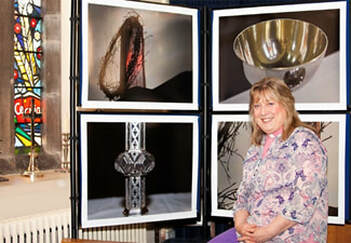
As I eat my breakfast this morning, I am remembering that twenty-five years ago, 23rd April 1994, almost to the minute, I was eating breakfast with a group of women at an hotel in Coventry anticipating our ordination service in Coventry Cathedral. We were the first, the first women to be ordained priest in Coventry Diocese, amongst the first to be ordained in the Church of England. It was an overcast day, not like the warm spring weather we are enjoying as I write.
We were by turns, nervous, excited and apprehensive. The world seemed to be watching these events unfold, the Church of England ordaining its first women priests, the local media were waiting and so were we. Many people had been waiting a long time for this. This movement had been resisted for so long and in some places still is. Which is ironic considering that the first preachers of the Easter story were women.
Twenty-five years later this still amazes me. It still amazes me that I was selected for ordination in the first place. People ask me, ‘what made you want to become a vicar?’ The title ‘vicar’ simply means that you have responsibility for leadership in a church. I’m always tempted to reply, ‘I never wanted to be a vicar, it happened by accident!’ But I rarely say that because it would undermine something much more profound. Though there is a truth in saying that I never envisaged myself as someone charged with ‘the cure of souls’ or with responsibility for leading a church community.
I offered myself for ordination because I felt God had given me something to say to the church and on behalf of the church something to say to the world. I wanted to be part of a movement in the world that would remind people that Jesus is alive, and God loves them. This vocation grew out of my first vocation to be a Christian, a follower of Jesus Christ. So, the foundational question is, why did I become a Christian?
I was raised in a Roman Catholic School and there I learned many of the gospel stories, so I knew about Jesus, his death and resurrection. But as it is with so many people, I abandoned any practice of churchgoing at the age of 11 and through all my teenage years I didn’t go to church, I no longer considered myself a person of religious faith. I also thought I had become not good enough to return to church, even if I wanted to. Then during a year when I was working in Switzerland a friend persuaded me to go with her to mass at the English-speaking Catholic Church in Lausanne. The experience was profound, the warmth and welcome of the priest caused me to feel that I had come home and consequently I spent the entire service in tears. This led to a rediscovery of faith and I became a Christian because someone told me about a God who loved me and who I could meet in Jesus. I became a Christian because I experienced God meeting me.
I knew all the stories about Jesus, but it was not until I met him for myself did I know the power of the resurrection that would change my life. I still need to meet him every day. So, the answer to ‘why did you become a vicar?’ is the same. I became a vicar because someone told me about a God who loved me and who I could meet in Jesus. I became a vicar because I experienced God meeting me. It still amazes me. Grace still amazes me. That in his grace towards his world God calls us to return home, to the heart of his love and trusts us with his work in the world. Twenty-five years ago, I had no clue what lay ahead. Tonight, I will visit a couple to prepare them for their child’s baptism in a few weeks’ time. Who knows where that first step on the Christian journey will lead for their baby girl? My journey as a Christian also continues, my vocation has taken a new direction as an artist but underpinning it all is the call to follow Jesus. I am held in this relationship, this vocation, not by my own efforts for at best my love is weak and changeable. It is the powerful love of God that holds me. When my sense of inadequacy or anxiety threatens to overwhelm, I call to mind this song: ‘Don’t be afraid, my love is stronger, my love is stronger than your fear. Don’t be afraid, my love is stronger, and I have promised, promised to be always near.’ This Eastertide, why not join me? |
CHARMAINES BLOGCountry Music Singer, Blogger, Art Student, Vicar, Writer. Archives
December 2020
CATEGORIES |
